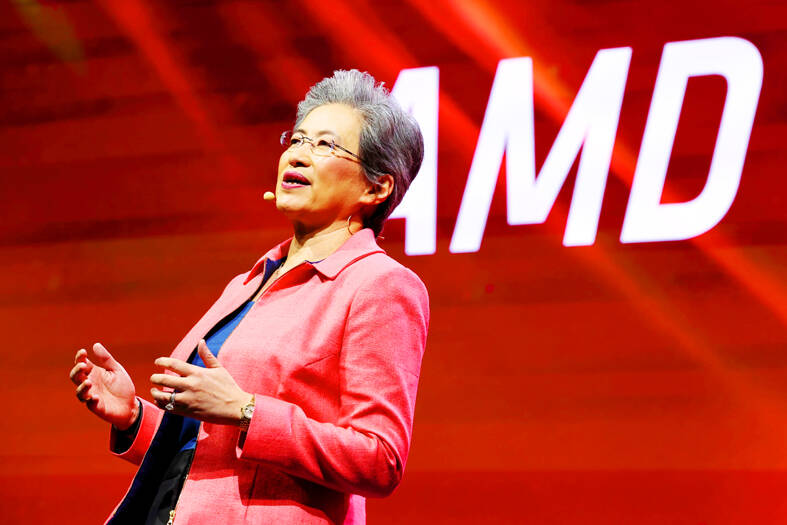Advanced Micro Devices Inc (AMD) has chosen to locate its new research-and-development (R&D) centers in Tainan and Kaohsiung, as part of the US chip company's NT$8.64 billion (US$270.5 million) project to advance its development of cutting-edge technologies such as artificial intelligence (AI) and silicon photonics, the Ministry of Economic Affairs said yesterday.
AMD’s latest investment would help to develop Taiwan into an “AI silicon island,” the ministry said in a statement after Minister of Economic Affairs J.W. Kuo (郭智輝) met AMD representatives led by David Wang (王啟尚), senior vice president of AMD’s graphics processing unit technologies and engineering, in Taipei yesterday.
AMD did not comment on why it chose two sites rather than one. Tainan is the birthplace of AMD chief executive officer Lisa Su (蘇姿丰) and is a major manufacturing hub of Taiwan Semiconductor Manufacturing Co’s (TSMC, 台積電) 3-nanometer chips for AI devices. In Kaohsiung, TSMC is building a new fab to produce next-generation 2-nanometer chips.

Photo: Ritchie B. Tongo, EPA-EFE
AMD is the latest in a series of global semiconductor companies seeking to build their R&D centers in Taiwan under the ministry’s A+ global R&D and innovation partnership program. The US chip company last month was granted a subsidy of NT$3.31 billion, about 38 percent of the company’s investment over three years.
AMD’s decision came as Taiwan has formed an extensive supply chain to provide components for the world’s AI devices, from AI chips made by TSMC to AI servers assembled by Hon Hai Precision Industry Co (鴻海精密), Quanta Computer Inc (廣達) and Wiwynn Corp (緯穎).
AI chip giant Nvidia Corp has set up its first AI R&D center in Taipei’s Neihu District (內湖) and is scouting sites for a second, likely in Kaohsiung.
Semiconductor equipment makers ASML Holding NV, Lam Research Corp and Applied Materials Inc previously also received grants to set up local R&D sites through the same program, the ministry said.
Kaohsiung has been working diligently to expand the local talent pool in collaboration with the nation’s prestigious schools. At the beginning of this year, National Tsing Hua University signed a memorandum of understanding with the Kaohsiung City Government to establish a branch in the city, following a similar agreement with National Yang Ming Chiao Tung University.
Based on details previously disclosed by the ministry, about 33 Taiwanese companies would take part in AMD’s R&D program, which would help to train more than 10,000 AI professionals each year for three years.

TARIFFS: The global ‘panic atmosphere remains strong,’ and foreign investors have continued to sell their holdings since the start of the year, the Ministry of Finance said The government yesterday authorized the activation of its NT$500 billion (US$15.15 billion) National Stabilization Fund (NSF) to prop up the local stock market after two days of sharp falls in reaction to US President Donald Trump’s new import tariffs. The Ministry of Finance said in a statement after the market close that the steering committee of the fund had been given the go-ahead to intervene in the market to bolster Taiwanese shares in a time of crisis. The fund has been authorized to use its assets “to carry out market stabilization tasks as appropriate to maintain the stability of Taiwan’s

STEEP DECLINE: Yesterday’s drop was the third-steepest in its history, the steepest being Monday’s drop in the wake of the tariff announcement on Wednesday last week Taiwanese stocks continued their heavy sell-off yesterday, as concerns over US tariffs and unwinding of leveraged bets weighed on the market. The benchmark TAIEX plunged 1,068.19 points, or 5.79 percent, to 17,391.76, notching the biggest drop among Asian peers as it hit a 15-month low. The decline came even after the government on late Tuesday authorized the NT$500 billion (US$15.2 billion) National Stabilization Fund (國安基金) to step in to buoy the market amid investors’ worries over tariffs imposed by US President Donald Trump. Yesterday’s decline was the third-steepest in its history, trailing only the declines of 2,065.87 points on Monday and

TARIFF CONCERNS: The chipmaker cited global uncertainty from US tariffs and a weakening economic outlook, but said its Singapore expansion remains on track Vanguard International Semiconductor Corp (世界先進), a foundry service provider specializing in producing power management and display driver chips, yesterday withdrew its full-year revenue projection of moderate growth for this year, as escalating US tariff tensions raised uncertainty and concern about a potential economic recession. The Hsinchu-based chipmaker in February said revenues this year would grow mildly from last year based on improving supply chain inventory levels and market demand. At the time, it also anticipated gradual quarter revenue growth. However, the US’ sweeping tariff policy has upended the industry’s supply chains and weakened economic prospects for the world economy, it said. “Now

An employment discrimination lawsuit against contract chipmaker Taiwan Semiconductor Manufacturing Co (TSMC, 台積電) might soon be expanded after a hearing in a federal court in San Jose, California, on Tuesday to add 15 plaintiffs to the case. According to a court document, the lawsuit, which was refiled in November last year as a form of a class action with 13 plaintiffs in California, wants to add 15 plaintiffs from Arizona, where TSMC is building up its wafer fab capacity. TSMC first committed between 2020 and last year to invest US$65 billion in three advanced wafer fabs in Arizona. It then pledged an